Fayette County, West Virginia, USA (late 1990’s / early 2000’s)
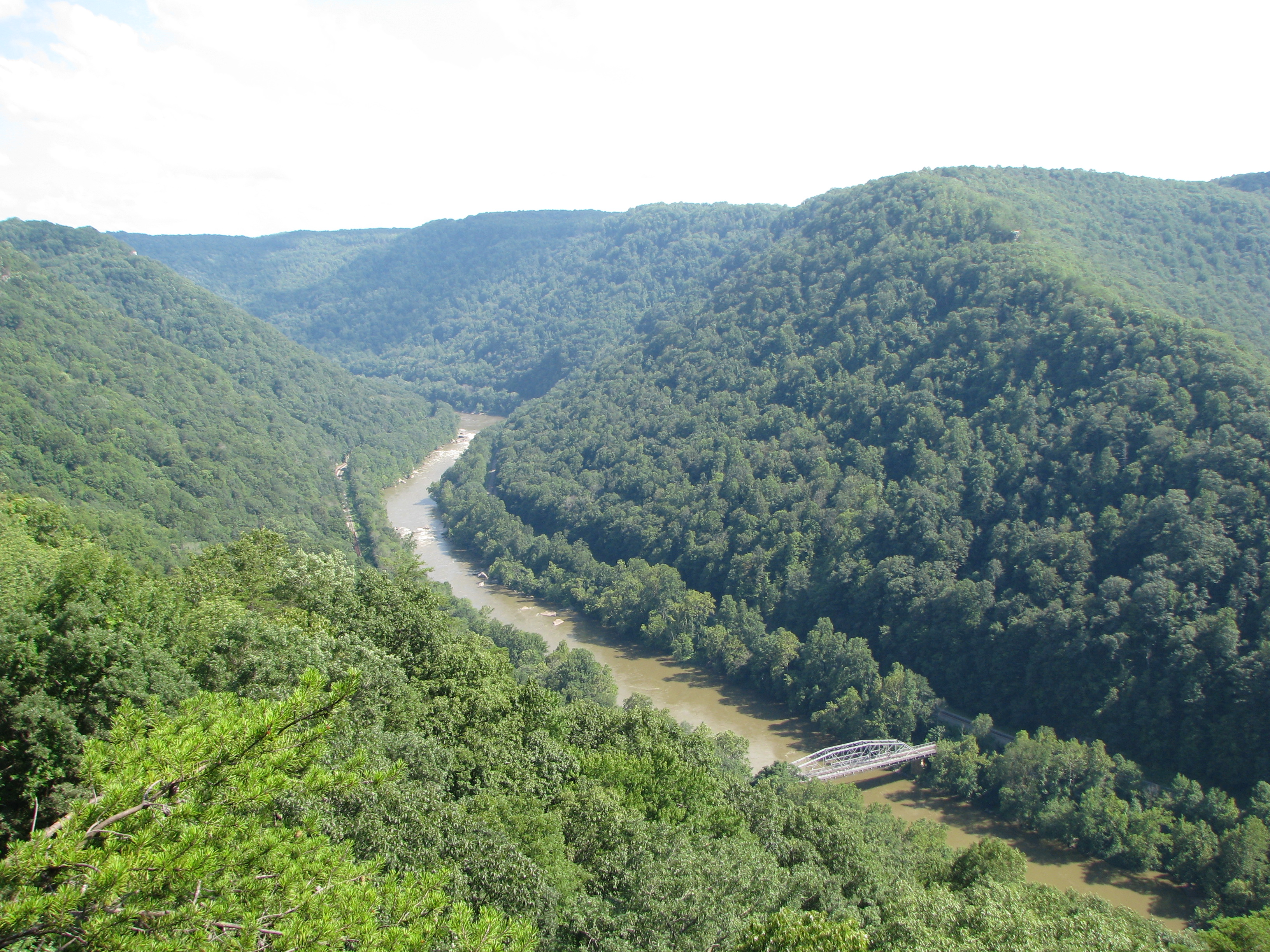
The momentous New River starts its journey in North Carolina’s Blue Ridge Mountains, a part of the Appalachian chain, as it gently winds its northerly way through forests, valleys and fields. It continues its rural journey into Virginia and occasionally past towns like Galax and Radford, before snaking through mountain passes into West Virginia. By the time it reaches Fayette County, it has managed to cut through a thousand feet of solid vertical rock, to later dump into the Kanawha River, then the Ohio and the Mississippi on its eventual trip to the Gulf of Mexico.
Admiring the View
We hiked a short distance down to the National Park Service overlook to admire this remarkable American Heritage River. Its power unfolded before us. Far below in a steep V-shaped valley rested a steadily flowing ribbon patiently sanding away stone as it had done long before mankind ever existed.
The river formed originally a half billion years ago as it drained a chunk of land where two gigantic tectonic plates slammed together to wrestle the Appalachian Mountains from the earth. Simultaneously it created a great natural corridor for plants and animals from areas that would eventually become the southern United States.
An Ancient Path
Indisputably the New River is ancient despite its name. People often parrot the somewhat dubious claim that it’s the second oldest on the planet after the Nile, but that’s a difficult claim to prove or disprove.
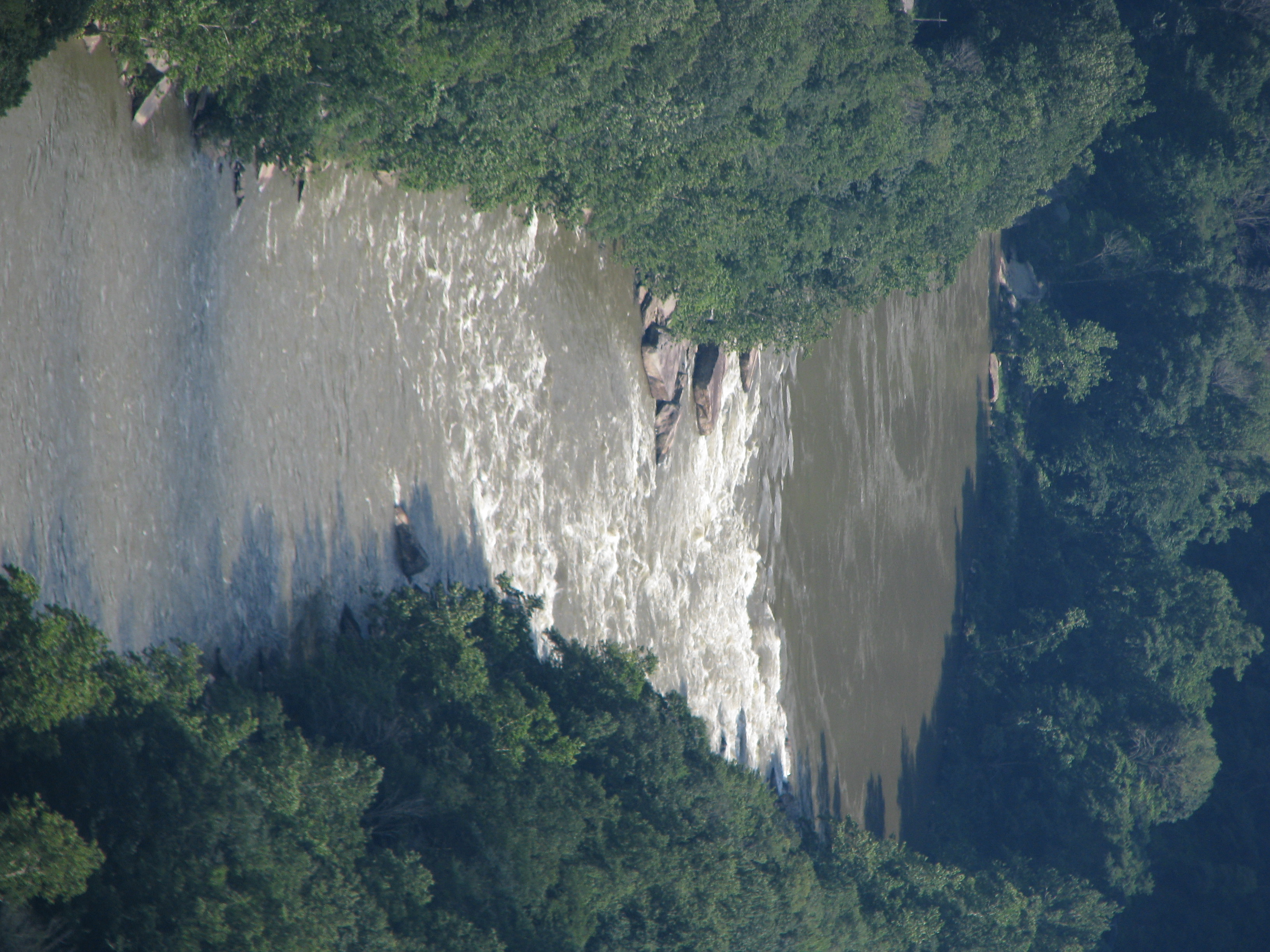
There are other claims that should also be viewed skeptically. Contrary to conventional wisdom, the New River does not cut entirely across the Appalachian Mountains. Also its flow towards the north is not all that unusual even in the eastern part of the United States. Nonetheless, even without these lofty titles, the natural beauty of the gorge provides plenty of superlatives all on its own.
A Gorge Bridged
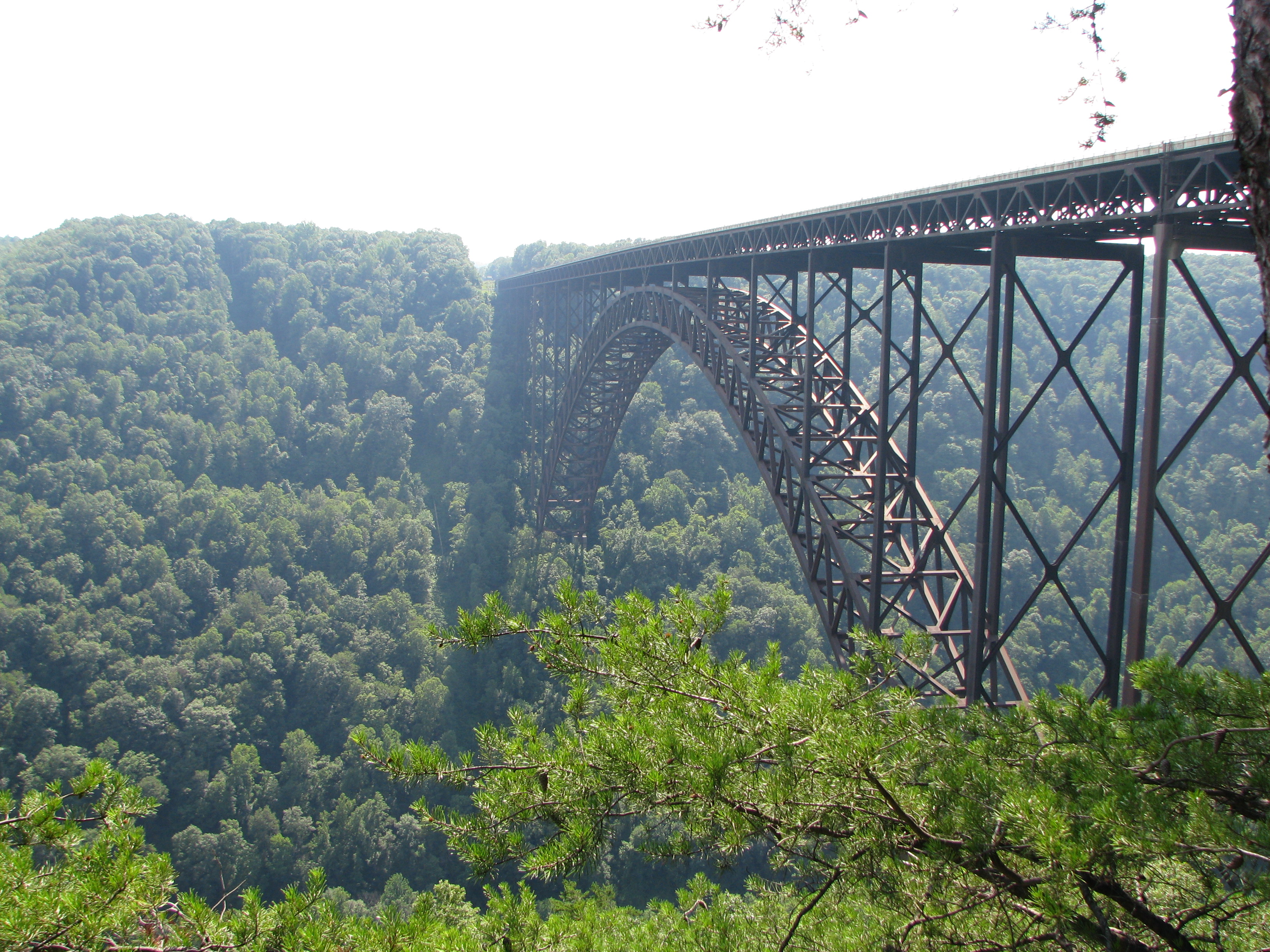
The graceful steel-arch of the New River Gorge Bridge spans between the two sides of the valley. Its 3,030 foot length makes it the second longest steel-arch bridge in the world. The quick drive across provides an inspirational view.
BASE (Building, Antenna, Span, and Earth) jumpers gather here on the third Saturday of each October for the annual Bridge Day celebration, the world’s largest extreme sporting event. The festivities attracts 200,000 visitors in a six hour spectacle that has quickly become West Virginia’s biggest one-day event. Imagine the sight of hundreds of daredevils from around the world safely and legally flinging, rappelling, and zip-lining themselves from the bridge deck towards the river 876 feet below.
Putting In
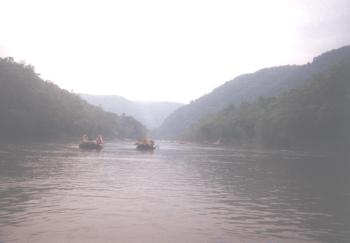
We traveled to the New River Gorge for some of the best whitewater in the eastern United States, where rapids range from Class III to Class V. Being amateurs, we made sure to select a reputable commercial outfitter to guide us through the currents. An old converted school bus rumbled along mountain roads and switchbacks as it descended to the valley floor at the Cunard put-in.
Rafters commonly select either the Upper Gorge with its long placid stretches and occasional light rapids, or the Lower Gorge with its boulders, currents, undercuts, whirlpools and hydraulics. There are gradations even on the Lower Gorge based on water levels and personal preferences. Some rafters put-in at Thurmond, a starting point that provides a nice warm up with some easy paddling before hitting the big water (map). Others dispense with the niceties and start closer to the action at Cunard (map). This is the whitewater that brought notoriety to the New River. We chose Cunard. Eight miles of glorious mayhem readied itself for our passage.
Getting Adjusted
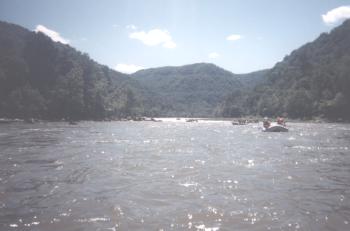
The beginning of the adventure allowed us to enjoy some scenic natural settings and contemplate the rich history of the New River Gorge. We adjusted to our gear and let the current pull us downstream. At one point we hopped from the raft and let our life vests carry us through the appropriately named Swimmer’s Rapid. The gentle float gave way to stronger currents as the first hesitant whitecaps disturbed the surface.
People have lived in the gorge for centuries, first native Americans and then early European pioneers who sustained themselves on what they could gather, hunt or grow. Later came loggers and coal miners, using railroads to carry away natural resources extracted through the sweat of mountaineers.
Frontier justice became the rule of law in isolated hamlets along the river. The Dunglen Hotel in Thurmond once hosted a continuous poker game that lasted fourteen years. Disagreements could end at the point of a gun. Few roads reached this isolated area and only the train truly existed to connect communities along its steel path through the gorge. Even today AMTRAK passengers can ride the gorge at river-level and depart at Thurmond as the Cardinal passes on its crescent-shape route between New York and Chicago.
The Warm Up
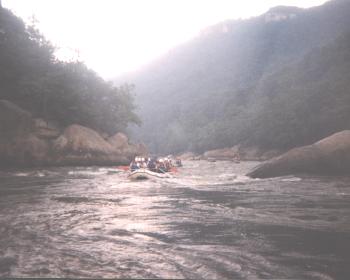
Daydreaming done, our attention returned to the adventure that confronted us as we approached a narrow slot between ancient stones. Each raft in succession rocked and jumped over constricted rapids, like rats swallowed by a ravenous snake. Rafters acted as a team, paddling forward and backwards furiously to staccato commands. Everyone made it through the falls upright, exhilarated by the ride but eager for greater challenges. This was just a warm-up for the real action to follow.
Hitting Turbulence
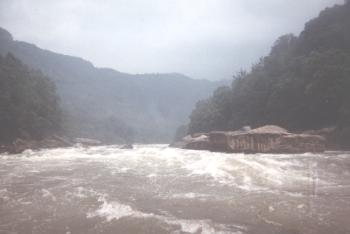
I glanced up from my spot on the raft and spied a massive whitewall drop-off directly in our path, like an ocean breaking onto the shore. Menacing stone fangs closed from either bank as we faced the single choice to continue downstream, either with our rafts or without. Currents were already too strong to avoid the frantic turbulence even if we’d wanted to change our minds. We were going down.
I had one final second to snap a photograph with my disposable waterproof camera and dug in with my paddle, hoping for sufficient momentum to pull us through the falls. Rafts fell into holes and flipped. Hydraulics grabbed the backs of others, filled them with water, and tossed passengers into the current to fend for themselves. Rocks, shelves and waves rocketed rafts through the gorge, into rapids with menacing names like the Greyhound Bus Stopper, Thread the Needle, Flea Flicker and Old Nasty. Waves have pulled me out of rafts plenty of times, but not today.
Success
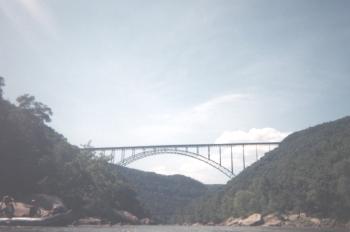
The New River Gorge bridge came into view to mark the approaching end of our excursion, and a chance to finally catch our breath This also provided another perspective on the immensity of the gorge. In the days before the bridge crossed the chasm, people had to wind their way down narrow roads to the valley floor and corkscrew their way back up in a 40 minute ordeal. Now they could cross in less than a minute. We paddled under the bridge, took our raft from the river, and rode back to camp.

Leave a Reply